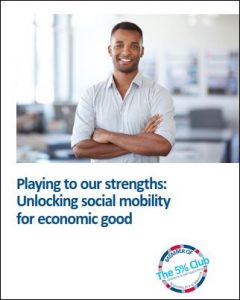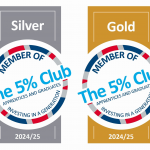Improving social mobility and better education and training are two key ways to address the UK’s productivity gap, says a new report from The 5% Club, published today (Thursday 13 September). ‘Playing to our strengths: Unlocking social mobility for economic good,’

In its report, the training and skills campaign group sets out a series of recommendations for business leaders and government to drive social mobility, whilst at the same time, ensuring inclusive growth. Recommendations are endorsed by Professor Sonia Blandford, Founder and CEO of award-winning charity Achievement for All, and Justin Madders MP, Chair of APPG on Social Mobility.
A person’s family circumstances can still dictate their employment prospects. Young people from disadvantaged families today, are a third more likely to drop out of education at 161 to pursue lower-skilled, lower-paid and insecure jobs. Furthermore, where a child comes from in
the country has a profound impact on their prospects for social mobility, with regional disparities in the UK now wider than in any other western European country2.
At the same time, with many areas of the economy experiencing skills shortages, employers are increasingly looking at what action can be taken to increase diversity in their businesses to attract the most talented people.
According to The 5% Club, the provision of ‘earn and learn’ training opportunities is key. Young people from disadvantaged backgrounds must be made aware of the many technical and vocational options available today. ‘Earn and learn’ training opportunities, such as apprenticeships, offer people the chance to be paid whilst training on-the-job and can provide long term, fulfilling careers. At present, because of a lack of awareness, businesses are still missing out on some of the brightest and best talent, stifling the country’s economic growth but also letting down young people who are most in need of support and opportunity.
Leo Quinn, Chairman and Founder of The 5% Club, and Group Chief Executive of Balfour Beatty explains:
“Business leaders and government urgently need to join forces to address the lack of social mobility in the UK today. Central to this is raising awareness amongst young people from less advantaged backgrounds about going down the route of ‘earn and learn’ to start building long-term careers while being paid. Many of our key industries are crying out for skilled workers to train on the job – so it’s a tragedy if we fail to reach those who desperately need this chance.
“As employers we must ensure that traditional recruitment methods are not inherently discriminatory. We must open up early work experience or internships to all – the first vital step into the world of work. Equally, positive careers advice in schools can tear down the perception that apprenticeships are ‘second best.’ And we must all press government to transform the apprenticeship levy into a broader skills levy.
“If we really want to unlock social mobility, we must work together to open the gates on a flood of untapped talent, helping society as a whole but also dramatically improving Britain’s economic prospects.”
Today’s report, ‘Playing to our strengths: Unlocking social mobility for economic good,’ involved consultation with The 5% Club’s members. It provides the following recommendations:
- Employers must develop strong links with schools and colleges in deprived areas and increase the access young people in those areas have to workplaces, mentors and work experience. Research3 shows that work placements, are particularly valuable for young people from low socioeconomic backgrounds, giving them access to the work environment and improving employability;
- Employers must examine their recruitment processes to ensure they understand where talented applicants from different backgrounds fall through the cracks (for example, the unnecessary process of requesting degrees for non-graduate roles). Support should extend beyond those at entry level. Employers should also examine whether there are internal barriers within the company that hamper those from disadvantaged backgrounds who are appointed from progressing up the career ladder, as well as developing programmes that support personal development;
- There must be an improved awareness and understanding of what apprenticeships are, what they offer and the levels available to address outdated perceptions that they are ‘second best.’ Effective careers advice should be offered throughout schools to ensure that all young people have an understanding of the range of jobs and industries they could work in. Learning about the workplace during the primary school years should also be increased;
- The Apprenticeship Levy should be evolved into a broader skills levy, with increased flexibility to allow it to be spent on other types of high-quality technical skills training;
- Funding for the Further Education sector needs to be stabilised. Relationships with employers must be strengthened – with both Further Education providers and employers taking responsibility for making this happen. And there must be a period of consolidation, to allow for the reforms to become established and for the sector to focus on making them a success.
Today, 67 of The 5% Club’s members will attend a conference at PwC’s Spinningfield’s office in Manchester to discuss social mobility and the role of ‘earn and learn’ in improving opportunities for those from disadvantaged backgrounds.
Stephen Hogan, Head of Social Mobility at PwC, contributed to The 5% Club’s report:
“We have always undertaken employability and skills work with schools near our offices, but as a result of our social mobility strategy we have started asking our people to think a bit differently. By mapping our office network against the country’s social mobility coldspots, we realised that we could make a real difference by broadening our horizons and working a little bit further away from our offices. In some cases, just travelling for maybe half an hour to an hour enables us to work with young people who have the greatest need for our support. That’s been really powerful for us.”
He adds: “Someone’s background should not determine their future, and it absolutely should not be a barrier to working with us. We want the best people to work for us, no matter where they’re from.”
Professor Sonia Blandford, Founder and CEO of award-winning charity Achievement for All and author of ‘Born to Fail? Social Mobility: A Working Class View’ is supporting the recommendations made in the report, and will be speaking at the conference taking place today.
“Today’s report from The 5% Club speaks to the current conversation about inequality in Britain. It looks at what we’ve learned (and failed to learn) about the working class, the true meaning of social mobility, and the impact – if we can get it right – it could have on us all and on society as a whole. Social mobility is about changing the way people think, act and engage and understanding there is an alternative way to live and work to ensure everyone can succeed. I welcome this report – we need to galvanise society to act fast and act now against what is ultimately the social injustice of our time.”
Justin Madders, MP and Chair of APPG on Social Mobility, also supports the conclusions of The 5% Club’s report. He says:
“Improving social mobility is not only important from a moral standpoint but an economic one as well. By widening access, organisations benefit from an increased pool of skills and experience; the more a company’s staff reflect their customers the greater understanding they will have of their wishes. Having diverse workforces, which encompass many different talents, backgrounds and experiences is crucial if we are to develop dynamic organisations. Put simply, improving social mobility is vital for the future of individuals, employers and the country as a whole.”
The 5% Club is an employer-led organisation, which encourages employers to create as many ‘earn and learn’ opportunities as possible. The 5% Club has more than 320 members representing businesses across many sectors and sizes. ‘Earn and learn’ opportunities are structured training programmes which give people the chance to work towards a qualification whilst being paid, such as apprenticeships and degree apprenticeships. Members aspire to reach 5% of their workforce undertaking ‘earn and learn’ within five years of joining The 5% Club.




